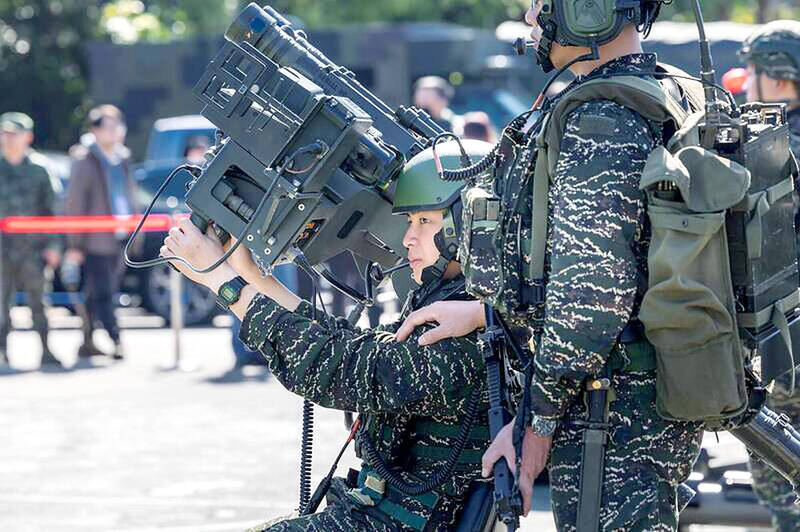Politics
China Expands Military Mock-Up Targeting Taiwan’s Leadership

China has significantly expanded a military training site designed to replicate government buildings in Taipei, increasing its size by nearly 300 percent since 2020. The site, which includes models of the Presidential Office Building and other key structures, is believed to be part of Beijing’s strategy to train the People’s Liberation Army (PLA) for potential strikes against Taiwan’s leadership, as reported by the Japanese newspaper Sankei Shimbun.
The developments were confirmed by a Taiwanese defense official, who noted the deployment of various military assets in the Boai District, which houses the Presidential Office and the Ministry of National Defense. The official emphasized that the PLA’s upgraded mock-up structures reflect a clear intention to prepare for a possible invasion of Taiwan. This training is also viewed as a form of psychological warfare against the island nation.
Satellite imagery from the Japan Institute for National Fundamentals revealed a newly constructed 280-meter tunnel linking the mock Presidential Office to the replica of the Judicial Yuan. Researcher Maki Nakagawa commented that such developments signal China’s efforts to intimidate Taiwan, suggesting that even if Taipei fortifies its infrastructure, its leaders remain vulnerable.
The PLA has been creating mock-ups of important government buildings for over a decade. Notably, in 2015, state broadcaster China Central Television aired footage of military exercises involving a model of the Presidential Office. Following this, construction of the mock Judicial Yuan began in 2020, completed by 2021. Recently, the PLA has also erected a replica of the Ministry of Defense’s Reserve Command building, with construction starting in November 2023 and concluding in April 2024.
Recent satellite images indicate ongoing military activities in the area, including the establishment of roadblocks and the deployment of armored vehicles. In August, PLA units were observed conducting maneuvers around the mock Presidential Office and the Ministry of Foreign Affairs, reinforcing the notion that training efforts are intensifying.
Responding to these developments, Taiwanese military officials have enhanced their defensive capabilities in the Greater Taipei Metropolitan Region. The focus of recent annual military exercises, known as Han Kuang, has been on improving defenses around the capital. The Taiwanese armed forces have deployed Patriot air defense systems and National Advanced Surface-to-Air Missile Systems (NASAMS) to create overlapping missile interception zones.
Additionally, systems such as Stinger missiles and automated close-in defense emplacements have been introduced to safeguard against low-flying threats. The Presidential Office is now protected by advanced anti-drone systems, marking a significant upgrade in Taiwan’s military readiness.
As tensions continue to rise in the Taiwan Strait, the expansion of China’s mock military site underscores the ongoing threat perceived by Taiwan. The international community remains watchful of these developments, given their potential implications for regional stability.
-

 Business5 months ago
Business5 months agoKenvue Dismisses CEO Thibaut Mongon as Strategic Review Advances
-

 Lifestyle4 months ago
Lifestyle4 months agoHumanism Camp Engages 250 Youths in Summer Fest 2025
-

 Sports4 months ago
Sports4 months agoDe Minaur Triumphs at Washington Open After Thrilling Comeback
-

 Sports5 months ago
Sports5 months agoTupou and Daugunu Join First Nations Squad for Lions Clash
-

 Top Stories5 months ago
Top Stories5 months agoColombian Senator Miguel Uribe Shows Signs of Recovery After Attack
-

 World5 months ago
World5 months agoASEAN Gears Up for Historic Joint Meeting of Foreign and Economic Ministers
-

 Health4 months ago
Health4 months agoNew Study Challenges Assumptions About Aging and Inflammation
-

 Business5 months ago
Business5 months agoOil Prices Surge Following New EU Sanctions on Russia
-

 Entertainment4 months ago
Entertainment4 months agoDetaşe-Sabah Violin Ensemble Captivates at Gabala Music Festival
-

 Entertainment4 months ago
Entertainment4 months agoBaku Metro Extends Hours for Justin Timberlake Concert
-

 Top Stories5 months ago
Top Stories5 months agoRethinking Singapore’s F&B Regulations Amid Business Closures
-

 Business5 months ago
Business5 months agoU.S. House Approves Stablecoin Bill, Sends to Trump for Signature









